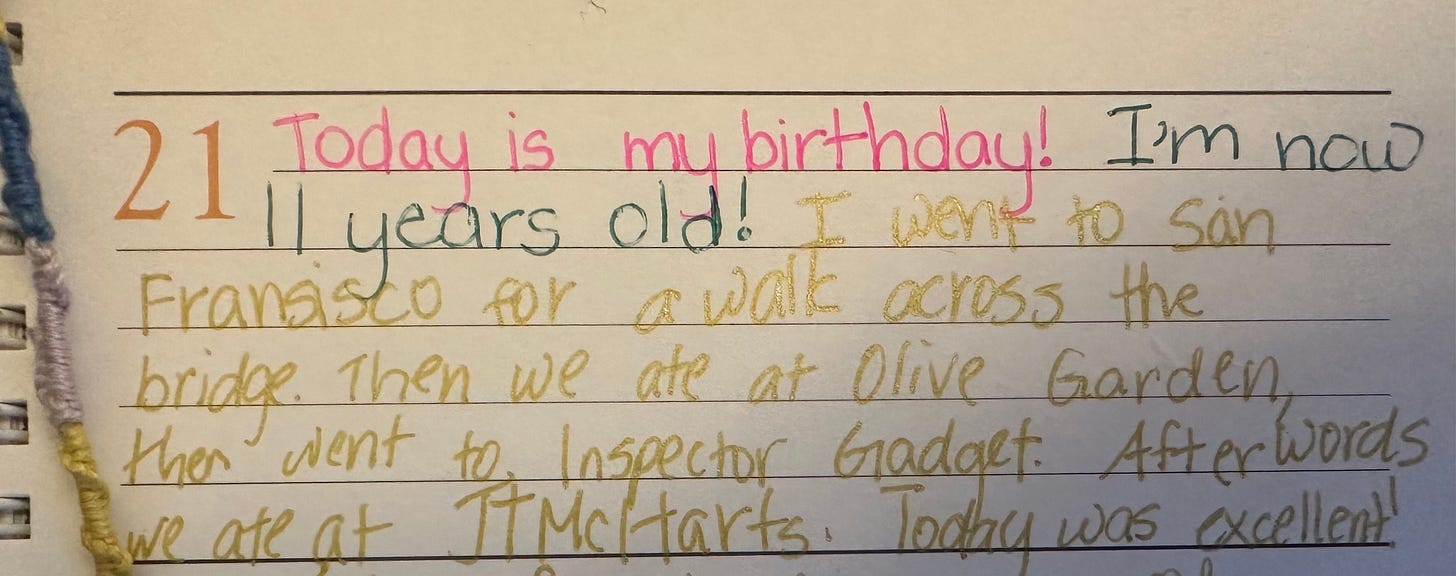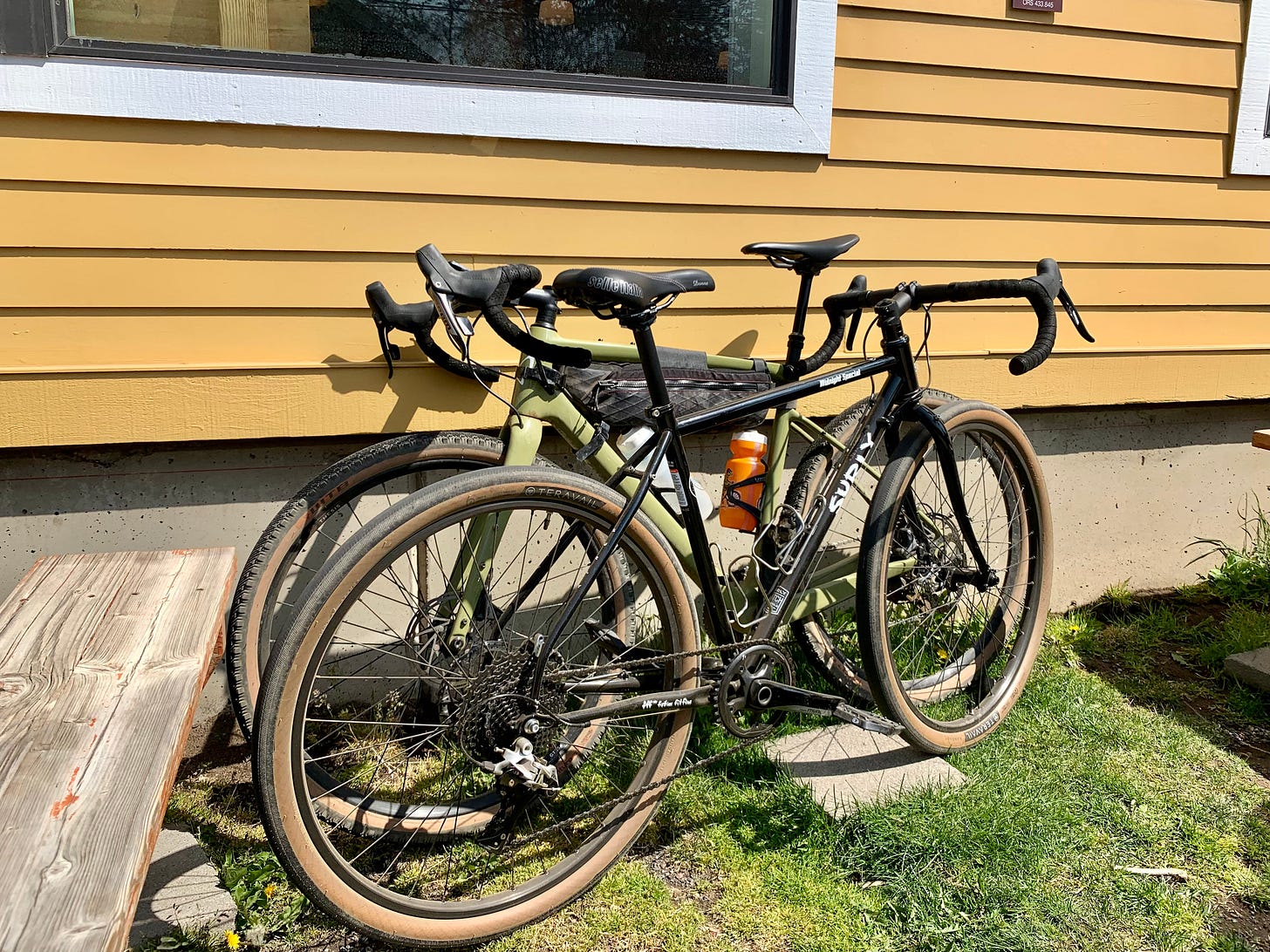What are the lines between "I" and "we" in a relationship?
Asking for a girlfriend (the girlfriend is me).
For as many years back as I can remember, I’ve planned my birthday with intention. For my eleventh, I asked my parents to drive me up to San Francisco so we could be standing on the Golden Gate Bridge at the exact time I was born. In recent years, I’ve spent the day mostly in nature, in the company of loved ones, and with personal reflection and good food.
How I spend my birthday is not only important to me, but also an expression of my individuality (yes I’m a Leo).
This year on my birthday, I received several messages from well-wishers hoping that my partner had planned a nice day for me. It was enough that I jokingly texted a friend, “When did having a good birthday become your partner’s responsibility? I can plan a nice day myself, but I’m glad he spent it with me 😂.”
There is a social norm around the role of partners in birthdays, and I’m not sure I agree with it. While my wish is to always spend my birthday with my partner, I don’t expect him to plan the day or to be responsible for my joy throughout it.
Still, the assumption and truth in these messages is that I am now intricately connected to another person, and in some ways, even my birthday is about both of us. In the month since my birthday, I’ve thought a lot about this.
What are the lines between “I” and “we” in a relationship? When are “I” and “we” the same, and when are they different? What does it mean to be an “I” and a “we?”
Single for most of my twenties and early thirties, I dedicated a lot of time discovering and leaning in to who I am. I created personally defining hobbies like running long distances, going on solo adventures (complete with typed itineraries), and writing Unabridged Ro. I learned to love being alone. My natural proclivity for alone time was bolstered by the leading piece of advice for single people who want to be in a relationship: focus on you.
They (the wise love lords) say that by doing the things you love and learning how to be a whole person, you create the ideal conditions for meeting a partner. (FWIW I don’t believe this to be entirely true.)
As I became more “I,” I witnessed many friends becoming “we” and maybe even too “we.” From my solo perch, there was so much I couldn’t comprehend. For example, why did my newly partnered friend save all her weekends for her boyfriend? Didn’t they have enough time together during the week? Why didn’t she ever ask to bring her boyfriend? Was she trying to keep our friendship separate from her relationship? Was it because I didn’t have a boyfriend?
While I was always conceptually searching for my person, it was only in my early thirties, during peak pandemic, that I craved partnership for the first time. I became viscerally aware that life isn’t meant to be lived alone. Of course I wanted all that comes with romanticized love, but I also just wanted a teammate in life’s mundane—cooking, cleaning, and taking out the trash.
I desperately wanted to be a “we.”
So much so that I would tell my coworkers what “we” did over the weekend while ambiguously referring to me and my dog.
Now that I’ve found my person, I notice ways in which I’m an elite version of my former single self because of who my partner is, our love for each other, and the irreplaceable role he plays in my life.
Still, finding the balance between “I” and “we” is like navigating uncharted territory.
What They (the wise love lords) don’t tell you about “focusing on you” is that when you meet your partner, you’ll need to reimagine “you” in the context of a partnership.
At thirty-five, I’m only now learning for myself what it means to be an “I” and a “we.” Sometimes it feels natural, sometimes exciting, and sometimes, if I’m being honest, impossible (but not actually).
Natural—
Cycling is an important part of my partner’s life. A few months after we met, I asked him to help me buy a bike. I’ve always loved a casual ride, but I’ll admit I was only motivated to get a bike so that we could ride together. We enjoy sunset rides, travel with our bikes to ride in new cities, and bike to and from date night (or make a date night of biking).
I love asking if “we” should go for a ride and “I” mostly only ride when “we” are riding.
Exciting—
After a conversation in which we shared our new year’s goals with one another, we starting holding quarterly meeting to discuss personal and joint goals and dreams. Personal goals cover categories like self-growth, career, and fitness. Joint goals cover travel and life-stage planning. Financial goals have personal and joint components.
I’ve always set goals for myself, but now in the context of “we,” the goals benefit from more support, accountability, energy, and joy.
We’re both on each other’s team, and when one of us wins, we both win.
Impossible (but not actually)—
One year into our relationship, I wrote about it for a submission to the New York Times Modern Love Column. I spent over one hundred hours lost in the writing process, drafting and editing my story. It was a true story about us, but when I was ready to call it “done,” it no longer felt like something of this world. It was art.
Before submitting my article, I shared the piece with my partner as a formality. He read it once, and then again, then finally expressed discomfort with the piece. His response dislodged any confidence I had about its quality. Was I required to make changes? Was he allowed to have opinions about my self-expression?
Through vulnerable conversations, we shared our perspectives with one another. Somewhere in my creative journey, I’d become desensitized to the fact that I was writing a story about him and us—real people and real events—to be read by a real audience.
For the first time, I recognized the challenges that arise when art meets its subject, or perhaps, when a subject meets the art he inspired. Writing is my most precious expression of “me,” and I (and we) are still learning how it exists in the context of “we.”
Am “I” alone, or do “we” as humans grapple with who we are as individuals and couples in relationships? According to Esther Perel, I’m in good company (and who needs any other source, really?).
In her article “Why Modern Love is So Damn Hard” she writes how common it is to feel that commitment results in a loss of self.
The idea that we lose ourselves in the presence of our partner is deeply ingrained in the modern perception of love, particularly in the United States. […] Is it any wonder that, tied up in relying on a partner for compassion, reassurance, sexual excitement, financial partnership, etc. that we end up looking to them for identity or, even worse, for self-worth?
How can we commit to another without losing ourselves in trying to meet these vast expectations? How can we be in a fulfilling partnership that also helps us grow as individuals?
I haven’t lost my sense of self. In fact, I know who I am more now that I’m in this relationship than I did before it. But I am interested in understanding and redefining my sense of self in the context of partnership. To start, Esther suggests being clear about our expectations from a partner.
So in what areas do we want to invest with our partners, and in which areas do we need to invest in ourselves and our personal networks?*
In our early dating, I unintentionally turned my partner into my career coach. “Is my work meaningful?” I’d ask him out of the blue. “How can I feel like I’m doing more purpose-led work?” In an effort to bring him along on my personal journey, I introduced a “we” expectation to a very “I” journey.
Finally, I made a change by hiring a professional career coach. By relying on an expert and not my partner, I’ve not only seen personal progress toward defining my values and articulating my purpose, but I’ve also provided my partner with a more healthy and effective way of supporting me through my self-exploration. “What came up in your last session?” he’ll ask, or “What are you discovering?” He is playing the supporting role he’s meant to be in.
My therapist used to say that getting to know your relationship—your partner and yourself as a partner—is like a dance. We each lead and follow, and learn from one another along the way.
There’s no better metaphor for navigating “I” and “we” than a partner dance. While each dancer commits to supporting the other, they also have their own individual moments to shine. Each plays a unique part, but the choreography sings when both move in sync.
While I’m still figuring this all out, I know one thing for sure: Finding where “I” and “we” intertwine is an art that only “I” and “we” can create together. And it’s an art that only “we” will get to enjoy for all the birthdays (and mundane days) to come.
Have you been thinking about this too? Do you have a similar (or different) perspective? Start a conversation with Ro and the Unabridged Ro community or share this letter with a friend.







